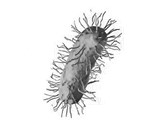
Bacterial recombinant proteins
Bacteria, particularly E. coli, are the most common expression systems for recombinant proteins. They offer rapid growth, easy manipulation, and high yields. However, E. coli lacks the machinery for post-translational modifications found in eukaryotic cells.
Applications
- Ideal for producing large quantities of proteins for research purposes.
- Suitable for proteins that do not require glycosylation or complex folding.
- Common in industrial enzyme production, such as proteases and polymerases.
Recent studies have highlighted the potential of using E. coli as an expression system for producing therapeutic proteins. Researchers have developed strategies to overcome the limitations of E. coli, such as codon optimization, chaperone co-expression, and periplasmic secretion, allowing for the production of complex proteins with improved solubility and activity. One notable example is the use of E. coli in the production of insulin. By expressing the human insulin gene in E. coli, researchers have been able to produce large quantities of this vital hormone, making it more accessible and affordable for patients with diabetes.
Moreover, E. coli has been employed in the production of vaccines. By expressing antigenic proteins from pathogens, E. coli can be used as a platform for developing recombinant vaccines, which are safer and more stable than traditional vaccines. In the field of industrial enzymes, E. coli continues to be a preferred expression system. For instance, the production of Taq polymerase, a crucial enzyme used in PCR (Polymerase Chain Reaction), relies heavily on E. coli expression systems. This has made Taq polymerase more widely available and cost-effective for researchers and diagnostic laboratories.
Search result : 277216 product found
Refine your search :
- Unconjugated 245939
- Biotin 26
- FITC 1
- human 66075
- mouse 33477
- e. coli 22593
- rat 15662
- bacteria 15075
- plant 10353
- cow 7430
- yeast 5785
- virus 3695
- pig 2809
- dog 905
- chicken 612
- monkey 499
- rabbit 489
- drosophila 428
- xenopus 393
- horse 347
- sheep 206
- swine 188
- goat 117
- cat 111
- guinea pig 84
- all species 67
- hamster 58
- zebrafish 54
- bird 46
- gorilla 14
- ferret 8
- goose 8
- pigeon 8
- frog 6
- rhesus 6
- fish 4
- bovine 3
- canine 3
- equine 3
- porcine 3
- e. coli 265743
- bacteria 11474
- virus 115
- pig 19
- human 8
- swine 5
- mouse 4
- c. elegans 1
- cow 1
- goat 1
- rat 1
- Protein/peptide 277216
- WB 46467
- ELISA 25574
- IP 23143
- Mass spectrometry 2110
- Purification 84
- Immunoassay 14
- SDS-PAGE 6
- Lateral Flow 5
- Assay 1
- EMSA 1
- IHC 1
- mouse 1
- Human 5337
- Mouse 1090
- Escherichia coli 424
- Rat 275
- Bovine 195
- 111
- Influenza A 80
- Avian 62
- Drosophila 48
- Mycobacterium tuberculosis 48
- Rhesus 45
- Streptococcus 43
- Dog 39
- Porcine 38
- Canine 27
- Chicken 24
- Influenza 24
- Pig 20
- Horse 15
- Rabbit 15
- Enterovirus 12
- Feline 9
- SARS-CoV-2 9
- Xenopus laevis 9
- Sheep 6
- Xenopus tropicalis 6
- Cat 3
- Frog 3
- Guinea pig 3
- Hamster 3
- human 3
- 100ug 2
- 50ug 2
- Mus musculus 2

